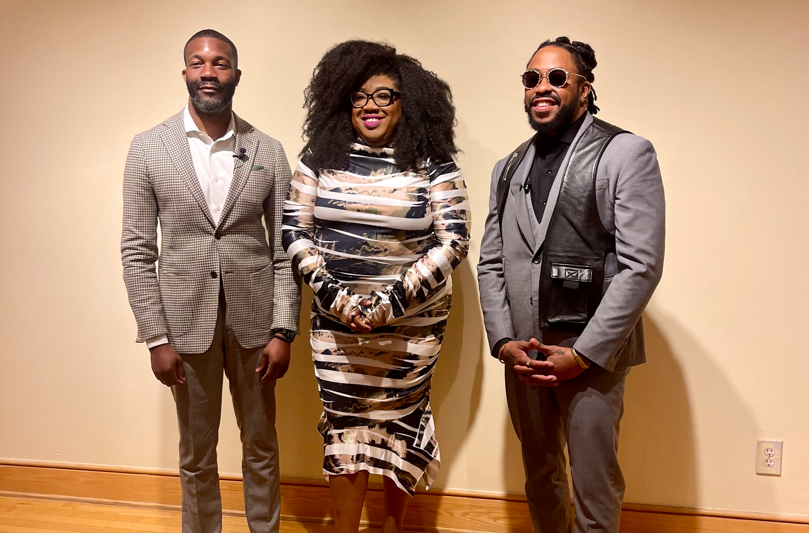

From left: Birmingham Mayor Randall Woodfin, BCRI President and CEO Dejuana Thompson, and singer-songwriter Raheem DeVaughn. (Courtesy of Jaedon Holloway Talley, The Birmingham Times)
Jadon Holloway-Talley | The Birmingham Times
Grammy-nominated singer-songwriter Raheem DeVaughn not only performed at the Alabama Theatre last week, but he also visited Birmingham to give back.
The day after Wednesday’s performance, Devaughn’s LoveLife Foundation hosted a “Let’s Talk Women’s Empowerment Luncheon,” bringing together elected officials, artists, advocates, community leaders and civic activists to discuss the health and mental well-being of Black women.
This special conversation took place at the Birmingham Civil Rights Institute in the Odessa Woolfolk Gallery.
“…I don’t come to the city, [and do a show] “Instead of just driving off, it’s best to do some community work so you can party with a purpose,” DeVaughn said at a news conference before the luncheon.
“There’s a lot going on in the black community. [and] “It’s not all negative, there are positives,” he continued. “Black women have always been the backbone of their families, and when I think of my mother and my grandmother, these initiatives and roundtables are very important to me.”
Devaughn said the ongoing “Let’s Talk” series was designed to pioneer solutions for Black women in underserved areas.
“…the trajectory of young people, their outcomes and their success in life is heavily influenced by the well-being of black women in the home,” he said. “When we talk about their stress levels, when we talk about whether they come from single-parent homes. [where the Black woman] “Women being the breadwinners, all these issues have to be fought and addressed because women, whether it’s women of color or women in general, carry a lot on their shoulders,” he said, adding, “I can’t think of a better approach.”
Raheem DeVaughn’s LoveLife Foundation hosted the Let’s Talk Women’s Empowerment Luncheon, bringing together elected officials, artists, advocates, community leaders and civic activists to discuss the health and mental well-being of Black women. (Jadon Holloway-Talley, The Birmingham Times)
BCRI CEO and President DeJuana Thompson hosted the roundtable luncheon.
“We want to always be that place that opens the door to learning, that engages with contemporary issues, that shows where the disparities are and where the opportunities are,” Thompson said. “I’m excited to talk about the fact that we can do something. We want to be solution creators. Anytime we can do that, I’m always for it,” she said at a press conference ahead of the event.
Discussions centered around topics such as Black women and domestic violence, HIV/AIDS and its shocking statistics among Black women and teenage girls, mental health, reproductive and health equity, and community resources and programs for children and teens.
Mayor Randall Woodfin noted at a press conference that the majority of Birmingham households are made up of single women.
“In a city like Birmingham, where 60% of households are run by women, black women’s health and HIV issues are key topics…[and] Coming together to discuss issues that are not only sensitive but also concern our community is a [crucial]” the mayor said.
Jefferson County Commissioner Shelia Tyson, who is also co-chair of the Alabama Black Women’s Roundtable, said the rally was important because “no one is addressing women’s mental health or the working poor who make $7.25 a year in Alabama.” [an hour]the rent is [poorest] community [average] $900. Nobody is talking about the impact. [poverty has] Regarding mental health…
“Mental health is so important in our community because it’s key to success, and it comes with health, wealth, stability, education and housing; [achieve success] “Winning is a state of mind,” she said.
Attendees at the luncheon included AIDS Alabama, ACLU Alabama, Birmingham City Schools, mental health professionals, members of the media and representatives from Gilead Sciences, one of the LoveLife Foundation’s largest donors.
“We are committed to advancing health equity and to do this we wanted to ensure we partnered with trusted influencers like Raheem DeVaughn, who is not only an artist but also an activist,” said Samantha Granberry of Gilead Sciences.
“Through this partnership, we had the opportunity to reach more than 35,000 Black women in each of 18 markets across the country within 30 days with HIV awareness, education, empowerment and most importantly, local resources,” she added.
For more information about the LoveLife Foundation, please visit Raheem DeVaughn’s LoveLife Foundation. For more information about Gilead Sciences, please visit www.gilead.com.
Like Loading…
Tara Thomas Agency stands at the forefront of the entertainment industry, with years of experience dedicated to nurturing the most exceptional talents and successful acts.